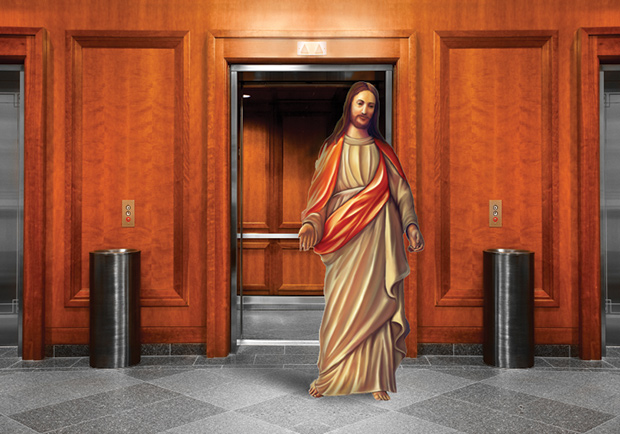The Sunday after President Obama delivered his second inaugural address, my pastor preached on Luke 4:14–21, the story of Jesus' reading from the Isaiah scroll in his hometown synagogue. After reading about God anointing a prophet to preach good news to the poor, bring release to the captives, and sight to the blind, Jesus applies the text to himself: "Today this scripture is fulfilled in your hearing."
This, my pastor said, was "Jesus' inaugural address"; framing it that way seemed natural. Just as the President had used his inaugural to outline the ways he would work over the next four years to make America better, Jesus used Isaiah 61 to outline his kingdom agenda.
I was relieved when my pastor didn't launch into a sermon on civil religion, the subject of his postinaugural Facebook posts. Instead, he focused on how Jesus' agenda dovetailed with our congregation's mission statement. When I mentioned "Jesus' inaugural" to a coworker, he said that his pastor had labeled Jesus' use of Isaiah 61 differently. The passage was, he said, Jesus' elevator speech.
Elevator speech is a term from the 1990s. In the early days of Web development, aspiring innovators prepared themselves for brief encounters with venture capitalists. If they could present their vision in the short span of an elevator ride, they might get the capital needed to bring vision to reality.
At first, I reacted negatively to labeling Jesus' announcement an "elevator speech." Because of the term's marketing overtones, it called to mind one of the worst books ever written about Jesus. In his 1925 bestsellerThe Man Nobody Knows, advertising pioneer Bruce Barton cast Jesus in the role of über-salesman and visionary organizational leader.
Barton was a man of his times. Like many other Protestants of the early 20th century, he was in revolt against evangelical religion. He particularly disliked the wimpy, victimized Jesus he had been shown in Sunday school. He thought the typical teaching about the Cross—Jesus as a willing sacrifice trying to appease an angry God—undermined the strength of Jesus' leadership and organizational innovation.
Barton ripped Jesus' saving work out of his gospel and substituted one great idea at its heart. It was "so much more splendid than all previous ideas," Barton wrote. Jesus "invited frail bewildered humanity to stand upright and look at God face to face! He called on men to throw away fear . . . and claim the Lord of Creation as Father."
This idea, he said, is "the basis of all revolt against injustice and repression, all democracy. For if God is the Father of all men, then all are His children and hence the commonest is equally as precious as the king. No wonder authorities trembled."
Barton was a younger contemporary of German theologian Adolf von Harnack. Like Harnack, he rejected the orthodoxy of the creeds and was more interested in the practical application of the Christian religion than in its theology. And Barton's words sound amazingly like these from Harnack, uttered 25 years before Barton wrote his book: "[T]he whole of Jesus' message may be reduced to these two heads—God as the Father, and the human soul so ennobled that it can and does unite with him. . . ."
Barton helped to gut the gospel out of American Protestantism just as Harnack had done in Germany.
A lesson from Barton: Applying a contemporary filter to the words of Scripture can easily mask their meaning. Nevertheless, we inevitably see Scripture first through eyes conditioned by our own culture and experience. It is our only point of departure.
We inevitably see Scripture first through eyes conditioned by our own culture and experience. It is our only point of departure.
Let's turn back to the two sermons and their analogies. One used a political metaphor (inaugural speech); the other, an entrepreneurial metaphor (elevator speech). Both preachers used their analogies to catch attention, but neither was shackled by them as Barton had been. Both moved easily to a genuine encounter with the text.
Despite my initial concerns, I believe these analogies have their virtues: An inaugural speech is both programmatic (here is what I propose to accomplish) and inspirational (these are the values we hold that should make it possible for us to achieve this together). Jesus' synagogue reading was both inspirational and programmatic. It was also political: It outlined what God wants for his beloved community.
The virtue of the elevator speech analogy is that it focuses on innovation and encapsulates a potential reality. With a clear vision, a properly equipped and supported visionary will move toward the right goal. Without a clearly defined goal, high-sounding ideals will languish.
Thanks to these analogies, I now hear Jesus' speech more acutely. I hear the hunger of the entrepreneur and the (com)passion of the social reformer. In the right hands, the analogies made the Jesus on the page come alive.










